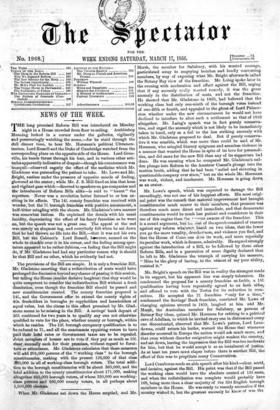NEWS OF THE WEEK.
THE long promised Reform Bill was introduced on Monday night in a House crowded from floor to ceiling. Archbishop Manning lurked in a corner under the galleries, vigilantly and perseveringly watching the scene,—for he staid through the dull dinner time, to hear Mr. Horsman's political Ultrainon- tanism. Lord Russell and the Duke of Cambridge watched from the corresponding place on the opposite side of the House. Lord Gran- ville, his hands thrust through his hair, and in various other atti- tudes apparently indicative of despair—though his countenance was tranquil—observed eagerly the effect of the medicine which Mr. Gladstone was persuading the patient to take. Mr. Lowe and Mr. Bright, restless under the pressure of opposite moods of feeling, glowered at the orator ; while Mr. J. S. Mill fixed on him that keen and vigilant gaze which—directed to speakers on gas companies and the introducers of Reform Bills alike—is said to " haunt " the reporters. Never was a revelation better listened to or less ex- citing in its effects. The 141. county franchise was received with wonder, but the 71. borough franchise with positive amusement, a half-titter mingling with the cheers. Mr. Gladstone's own manner was somewhat listless. He explained the details with his usual lucidity, depreciating the effect of his fancy franchise as he went on, but the speech was not a great one. The appeal at the end was merely an eloquent tag, and everybody felt when he sat down that he had thrown no life into the Bill,—that it was not his own Bill, but the Cabinet's. Lord Russell, hsavever, seemed on the whole to chuckle over it in his corner, and the feeling among spec- tators appeared to be rather dubious,—a feeling that the Bill might do, if Mr. Gladstone had had any particular reason why it should be that Bill and no other, which he evidently had not.






























